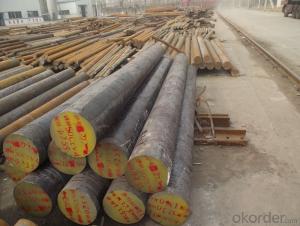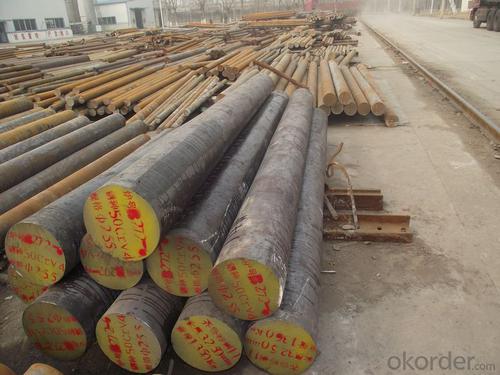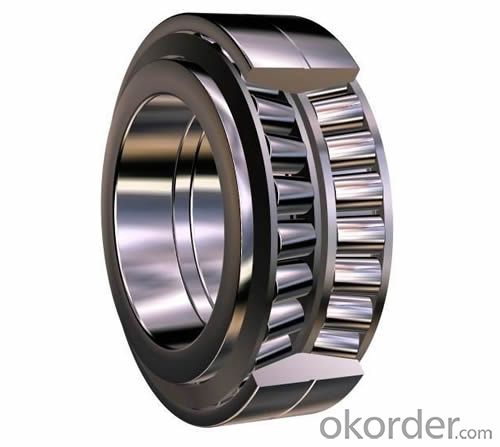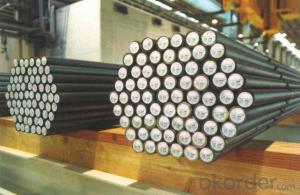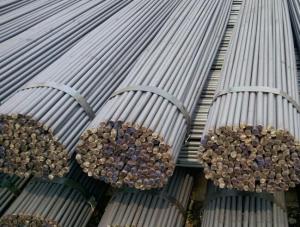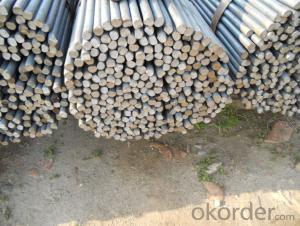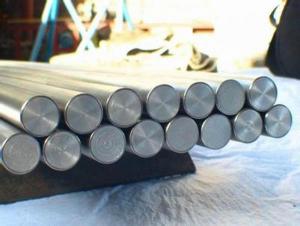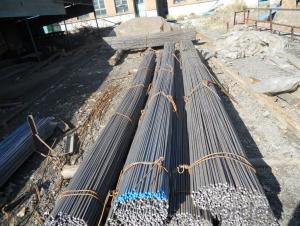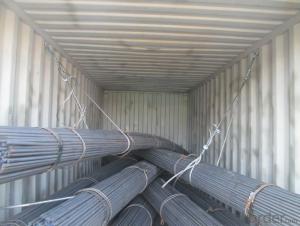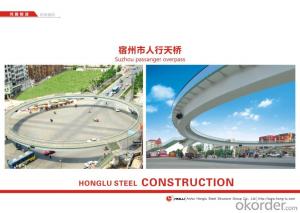Galvanized round bar structure steel made in China
- Loading Port:
- Tianjin
- Payment Terms:
- TT or LC
- Min Order Qty:
- 10000 m.t.
- Supply Capability:
- 10000 m.t./month
OKorder Service Pledge
OKorder Financial Service
You Might Also Like
Product Description:
OKorder is offering Galvanized round bar structure steel made in China at great prices with worldwide shipping. Our supplier is a world-class manufacturer of steel, with our products utilized the world over. OKorder annually supplies products to European, North American and Asian markets. We provide quotations within 24 hours of receiving an inquiry and guarantee competitive prices.
Product Applications:
Galvanized round bar structure steel made in China are ideal for structural applications and are widely used in the construction of buildings and bridges, and the manufacturing, petrochemical, and transportation industries.
Product Advantages:
OKorder's round bar structure steel are durable, strong, and resist corrosion.
Main Product Features:
· Premium quality
· Prompt delivery & seaworthy packing (30 days after receiving deposit)
· Corrosion resistance
· Can be recycled and reused
· Mill test certification
· Professional Service
· Competitive pricing
Product Specifications:
Grade | AISI 52100, ASTM E52100, DIN 1.3505,JIS SUJ2, GCr15 |
Dimensions | Diameter: 30-60mm Length: 2000-13000mm or as required |
Shape | Round Bar |
Type | Alloy Steel Bar |
Delivery Condition | Black Surface |
Material | Bearing Steel |
Technique | Hot Rolled |
Usage and Applications of Bearing Steel Round Bar
Bearing steels are used for ball and roller bearing applications and are comprised of low carbon steels and high carbon through harden able steel.
First the famous 1C-1.5Cr steel from which the majority of bearings are made. Its structure is apparently well-understood and the focus is on purity in order to avoid inclusions which initiate fatigue during rolling contact. Then there is the M50 steel and its variants, from which bearings which serve at slightly higher temperatures in aeroengines are manufactured, based on secondary-hardened martensite.
Tapered roller bearing are generally used to support combined load mainly consisting of radial load. Their cups are separable for easy assembling ,During mounting and using, radial clearance and axial clearance can be adjusted and preloaded mounting can be made.
Packaging & Delivery of Bearing Steel Round Bar
Packaging Detail: ASTM 52100 Steel in seaworthy packing or on customer request; Packed in bundles with standard export sea-worthy package or as customer require
Delivery Detail: 45 days after confirmed
Trade terms: FOB, CFR, CIF ou as customer's required
MOQ: 25 tons or at customer's demands. If the quantity is good, the price will be better.
Processing of Bearing Steel Round Bar
The processing of Bearing Steel Round Bar is hot rolled (strictly control sulphur, phosphorus and non-metallic inclusions content and distribution)
Chemical Composition of Bearing Steel Round Bar
C | Si | Mn | Cr | Ni | Cu |
Equal or less than | |||||
0.95-1.05 | 0.15-0.35 | 0.25-0.45 | Cr:1.40-1.65 | 0.30 | 0.25 |
All products' chemical composition and specification can be design according to customers' requirement.
Note of Bearing Steel Round Bar
1. According to national standard (GB) for our products, if not, supply according to national standards (GB) or agreement.
2. We can not only provide electric furnace +LF+VD and electros lag re-melting (ESR) steel forging materials, but also forging products of piece, bar, etc.
3. Our company is equipped with roll equipment and can provide our customers with roll billets or finished.
4. Please send us your detailed specifications when inquire. We will reply to you ASAP.
5. Certificate of quality is issued in English, in addition the normal terms, production process, the mechanical property (yield strength, tensile strength, elongation and hardness. forged ratio, UT test result, Grain size, heat treatment methods and the sample of is shown on the certificate
FAQ:
Q1: How soon can we receive the product after purchase?
A1: Within three days of placing an order, we will begin production. The specific shipping date is dependent upon international and government factors, but is typically 7 to 10 workdays.
Q2: What makes stainless steel stainless?
A2: Stainless steel must contain at least 10.5 % chromium. It is this element that reacts with the oxygen in the air to form a complex chrome-oxide surface layer that is invisible but strong enough to prevent further oxygen from "staining" (rusting) the surface. Higher levels of chromium and the addition of other alloying elements such as nickel and molybdenum enhance this surface layer and improve the corrosion resistance of the stainless material.
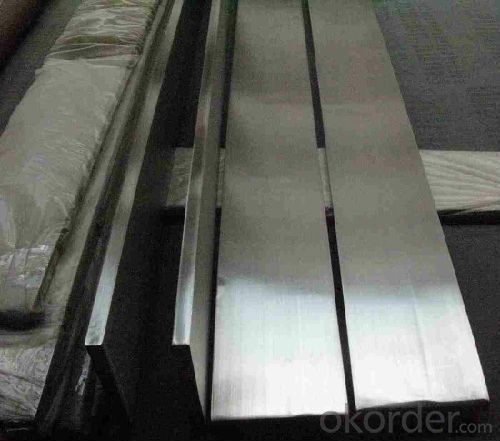
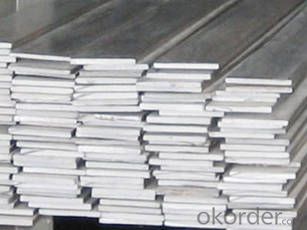
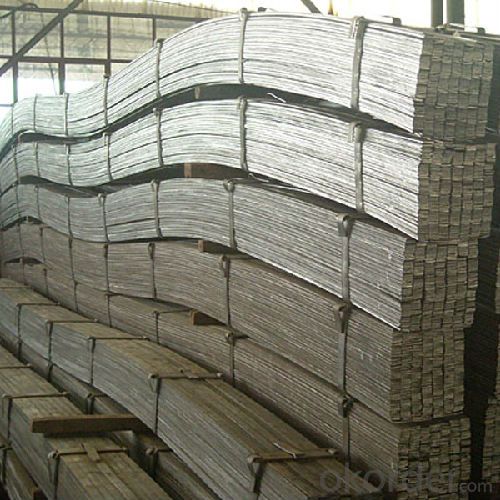
- Q: How does special steel contribute to the waste management industry?
- Special steel contributes to the waste management industry in various ways. Its exceptional strength, durability, and resistance to corrosion make it ideal for manufacturing equipment used in waste management processes. Special steel is extensively used in the construction of waste sorting systems, recycling machinery, and waste containers, ensuring their longevity and reliability. Additionally, special steel can be recycled itself, reducing the environmental impact of waste management operations and promoting sustainability in the industry.
- Q: What are the applications of special steel in the defense sector?
- Special steel has numerous applications in the defense sector due to its exceptional strength, durability, and resistance to extreme conditions. It is commonly used to manufacture various components of weapons and military vehicles, such as gun barrels, armor plates, missile casings, and aircraft landing gear. Additionally, special steel is utilized in the construction of submarines, warships, and military infrastructure due to its corrosion resistance properties. Overall, special steel plays a crucial role in enhancing the performance, efficiency, and safety of defense equipment and infrastructure.
- Q: What are the properties of shock-resistant steel?
- Shock-resistant steel is a type of steel that possesses certain properties that make it highly resistant to shock or impact. These properties include high toughness, strength, and ductility. It can absorb and distribute the energy generated by an impact, thus preventing the material from fracturing or breaking. Additionally, shock-resistant steel often has a high hardness, which further enhances its ability to withstand sudden loads and impacts without deforming or failing. These properties make shock-resistant steel suitable for applications that require protection against heavy impacts, such as in construction, automotive, and military industries.
- Q: How does precipitation hardening enhance the strength of special steel?
- The process of precipitation hardening, which is also referred to as age hardening, serves to boost the strength of specific steel alloys through a heat treatment technique. This technique involves a series of steps that lead to the formation of small particles or precipitates within the microstructure of the material. The strength of special steel is mainly determined by the arrangement and interaction of its atoms. Initially, the atoms of the alloy are randomly distributed, resulting in a relatively soft and malleable substance. However, through precipitation hardening, the formation of precipitates during the heat treatment process plays a vital role in strengthening the steel. The process commences by subjecting the steel to a high temperature, referred to as the solution treatment or aging temperature. This elevated temperature allows the atoms to dissolve and form a solid solution. Subsequently, the alloy is rapidly cooled to preserve the supersaturated state of the solution. After the rapid cooling, the steel is exposed to a lower temperature, known as the aging temperature. During this stage, the dissolved atoms start to migrate and cluster together, forming small precipitates within the microstructure of the material. These precipitates act as obstacles to the movement of dislocations, which are the primary carriers of plastic deformation in metals. The presence of these precipitates hampers the movement of dislocations, making it more challenging for them to glide through the crystal lattice. Consequently, the strength of the steel is significantly enhanced. The dislocation obstacles provided by the precipitates increase the resistance to deformation, resulting in improved hardness and strength. Furthermore, the size, distribution, and uniformity of the precipitates play a crucial role in determining the extent of strength enhancement. Smaller and more evenly distributed precipitates offer a higher density of obstacles, leading to a greater strengthening effect. Additionally, the process of precipitation hardening also influences other material properties, such as corrosion resistance and toughness. To conclude, precipitation hardening strengthens special steel by creating small precipitates within its microstructure. These precipitates impede the movement of dislocations, increasing resistance to deformation and resulting in improved hardness and strength. This heat treatment process is pivotal in the development of high-performance special steel alloys utilized in diverse industries.
- Q: How does special steel contribute to the industrial equipment industry?
- Special steel contributes to the industrial equipment industry by offering superior strength, durability, and resistance to corrosion and wear. It allows manufacturers to produce high-quality components and machinery that can withstand extreme conditions, resulting in longer equipment lifespan and improved performance. Additionally, special steel's versatility enables the production of complex shapes and sizes, leading to enhanced design possibilities and increased efficiency in various industrial applications.
- Q: How does special steel perform in high-temperature creep resistance?
- Special steel has excellent performance in high-temperature creep resistance. It is specifically designed to withstand prolonged exposure to elevated temperatures without undergoing excessive deformation. This is achieved through the addition of alloying elements and a careful heat treatment process, which help to enhance the steel's strength, stability, and resistance to creep. Special steel's superior creep resistance makes it a reliable choice for applications that involve high temperatures and long-term stress, ensuring the structural integrity and durability of the material.
- Q: What are the specific requirements for special steel used in the oil and gas pipeline industry?
- The specific requirements for special steel used in the oil and gas pipeline industry include high strength, corrosion resistance, and toughness to withstand harsh operating conditions. The steel must also have excellent weldability and formability for ease of fabrication and installation. Additionally, it should have low sulfur and phosphorus content to prevent embrittlement and ensure long-term durability. Furthermore, the steel should possess high fracture toughness and resistance to hydrogen-induced cracking, as well as meet specific dimensional and mechanical property standards set by industry regulatory bodies.
- Q: How is special steel used in the production of springs?
- Special steel is used in the production of springs due to its excellent mechanical properties. It provides the necessary strength, durability, and elasticity required for springs to function effectively. The unique composition and heat treatment of special steel enable springs to withstand high levels of stress and repetitive loading, ensuring their longevity and reliability in various applications such as automotive, aerospace, and machinery industries.
- Q: What are the different cutting grades of special steel?
- There are several cutting grades of special steel that are commonly used in various industries. These cutting grades are designed to possess specific properties and characteristics that make them suitable for different cutting applications. Some of the different cutting grades of special steel include: 1. High-speed steel (HSS): This cutting grade is known for its excellent hardness, wear resistance, and heat resistance. It can retain its hardness at high temperatures, making it ideal for cutting tools used in high-speed machining operations. 2. Tool steel: Tool steel is a versatile cutting grade that is used for a wide range of cutting applications. It offers high hardness, toughness, and abrasion resistance, making it suitable for cutting tools, dies, and molds. 3. Stainless steel: Stainless steel is a popular cutting grade due to its corrosion resistance and durability. It is commonly used in the food, medical, and automotive industries, where precision cutting and cleanliness are crucial. 4. Carbon steel: Carbon steel is a commonly used cutting grade known for its high strength and toughness. It is often used for cutting tools, knives, and blades. However, carbon steel is susceptible to corrosion, so proper maintenance and care are necessary to prevent rusting. 5. Alloy steel: Alloy steel is a cutting grade that is made by combining different elements to enhance its properties. It offers improved hardness, strength, and wear resistance, making it suitable for high-stress cutting applications. Alloy steel is commonly used in the aerospace, automotive, and construction industries. These are just a few examples of the different cutting grades of special steel. Each grade has its own unique properties and advantages, allowing manufacturers to choose the most suitable grade based on the specific cutting requirements and conditions.
- Q: What is the significance of alloying elements in special steel?
- The significance of alloying elements in special steel is that they enhance the properties and performance of the steel. These elements are added in varying proportions to achieve desired characteristics such as increased strength, improved corrosion resistance, enhanced hardness, better heat resistance, or increased toughness. Alloying elements also play a crucial role in controlling the grain structure, reducing brittleness, and improving the overall mechanical properties of the steel. Thus, alloying elements are essential in tailoring the steel's properties to meet specific industrial applications and requirements.
Send your message to us
Galvanized round bar structure steel made in China
- Loading Port:
- Tianjin
- Payment Terms:
- TT or LC
- Min Order Qty:
- 10000 m.t.
- Supply Capability:
- 10000 m.t./month
OKorder Service Pledge
OKorder Financial Service
Similar products
Hot products
Hot Searches
Related keywords
